Neville Compton to Succeed Peter Gölitz as Editor-in-Chief of Angewandte Chemie
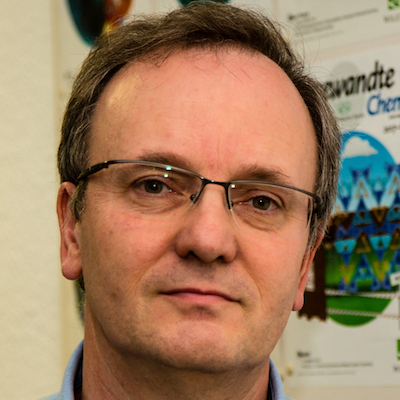 The German Chemical Society (GDCh) and Wiley-VCH would like to announce that Dr. Neville Compton will take over as Editor-in-Chief of Angewandte Chemie from October 1, 2017. Angewandte Chemie, the flagship journal of the GDCh, is a weekly publication steeped in tradition; the German edition is in its 129th volume, and the International Edition in its 56th.
The German Chemical Society (GDCh) and Wiley-VCH would like to announce that Dr. Neville Compton will take over as Editor-in-Chief of Angewandte Chemie from October 1, 2017. Angewandte Chemie, the flagship journal of the GDCh, is a weekly publication steeped in tradition; the German edition is in its 129th volume, and the International Edition in its 56th.
The journal publishes articles from all fields of chemistry and related disciplines. In 2016 almost 2700 communications and ca. 150 reviews were published; in addition the journal has a vibrant magazine section. All these features combine to make Angewandte Chemie a worldwide leading scientific journal – not only in chemistry.
Dr. Neville Compton studied chemistry at the University of Newcastle Upon Tyne, carried out postdoctoral research at the University of Heidelberg, and joined the editorial team of Angewandte Chemie in 1992 at the age of 27. In 1997 he was promoted to Deputy Editor, and in 2002 he became also the Editor-in-Chief of Chemistry – A European Journal. Under Dr. Compton’s editorship this journal has become one of the most important chemistry journals; Chemistry – A European Journal is the pre-eminent journal of ChemPubSoc Europe, an organization comprising 16 European chemical societies.
After 37 years working for Angewandte Chemie, 35 of which as Editor-in-Chief, Dr. Peter Gölitz is retiring. Under his leadership, Angewandte Chemie transformed from a national to a leading international journal; in 2016 the top four countries in terms of published papers inAngewandte Chemie were USA, China, Germany, and Japan. Peter Gölitz shaped the journal by attracting top authors from around the world and by developing the magazine section.
(quote: Neville Compton)
“I consider it a great honor to be offered this position at the flagship journal of the German Chemical Society. Like the GDCh, Angewandte Chemie is highly respected worldwide. I will do everything in my powers together with the Editorial Board and experienced Editorial team to further enhance the reputations of both and to ensure that Angewandte Chemie remains the premier location for top quality chemistry from top authors worldwide for years to come.”
„Angewandte Chemie had long been the shop window for the best chemistry from Germany when I took over as Editor-in-Chief in 1982“, so Dr. Gölitz, „it has been a pleasure to develop it into a platform for authors from all over the world; I am certain that Neville Compton will give Angewandte Chemie new impulses and strengthen its position further in the competitive environment .“
Prof. Thisbe K. Lindhorst, President of the GDCh underlines: “The GDCh Board of Directors enthusiastically endorses the nomination of Dr. Neville Compton as successor of Dr. Peter Gölitz. We are confident that Angewandte Chemie will continue its leadership and to set the standards among international chemistry journals. We are delighted that we can officially mark this changing of the guard at the 150th Anniversary celebrations of the GDCh in September in Berlin.” GDCh Executive Director Prof. Wolfram Koch adds:
„We have in Dr. Compton found a new Editor-in-Chief who can maintain the strengths of Angewandte Chemie and thanks to his experience with Chemistry – A European Journal develop new routes to make the journal even more attractive to readers worldwide.“
(Quote: Guido Herrmann, VP and Managing Director Wiley-VCH)
“Neville Compton is one of the most experienced editors and managers for scientific chemistry journals worldwide. Under his leadership Angewandte Chemie will further strengthen its position as a leading journal in the field.”
About Wiley-VCH
Co-Founded by the Deutsche Chemische Gesellschaft in 1921 as Verlag Chemie, we can look back over 90 years of publishing in the fields of chemistry, material science, physics and life sciences as well as business and trade. Since 1996 we have been part of John Wiley & Sons, Inc., based in Hoboken, New Jersey, USA.
About Wiley
Wiley, a global company, helps people and organizations develop the skills and knowledge they need to succeed. Our online scientific, technical, medical, and scholarly journals, combined with our digital learning, assessment and certification solutions help universities, learned societies, businesses, governments and individuals increase the academic and professional impact of their work. For more than 200 years, we have delivered consistent performance to our stakeholders. The company's website can be accessed at www.wiley.com.
Angewandte, Wiley-VCH
21.06.2017
Renaming of KGF to Swiss Industrial Science Fond (SISF)
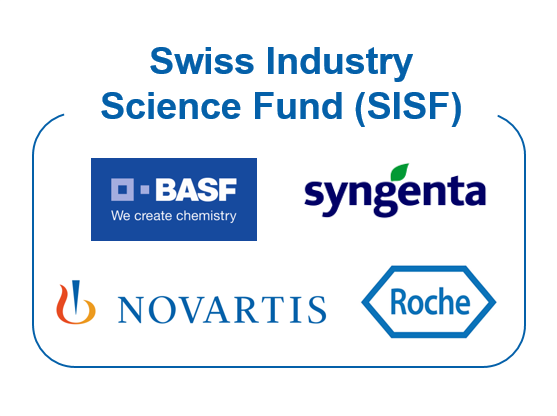 At its meeting in early June 2017, the board of the former Kontaktgruppe für Forschungsfragen (KGF) decided to rename the organization to a more generic and more self-explanatory name. With immediate effect, the organization is called Swiss Industrial Science Fund (SISF).
At its meeting in early June 2017, the board of the former Kontaktgruppe für Forschungsfragen (KGF) decided to rename the organization to a more generic and more self-explanatory name. With immediate effect, the organization is called Swiss Industrial Science Fund (SISF).
About the SISF
The Swiss Industry Science Fund (SISF) promotes scientific excellence in research and education in Switzerland, within the scope of its member companies.
The SISF is an unregistered partnership of the member companies (in alphabetic order): BASF, Novartis, Roche and Syngenta.
Each member is represented through one or two delegates. They meet quarterly to discuss and decide on applications for support.
David Spichier, SCS
20.06.2017
Hans Peter Lüthi, ETHZ, elected as Executive Board Member of scienceindustries
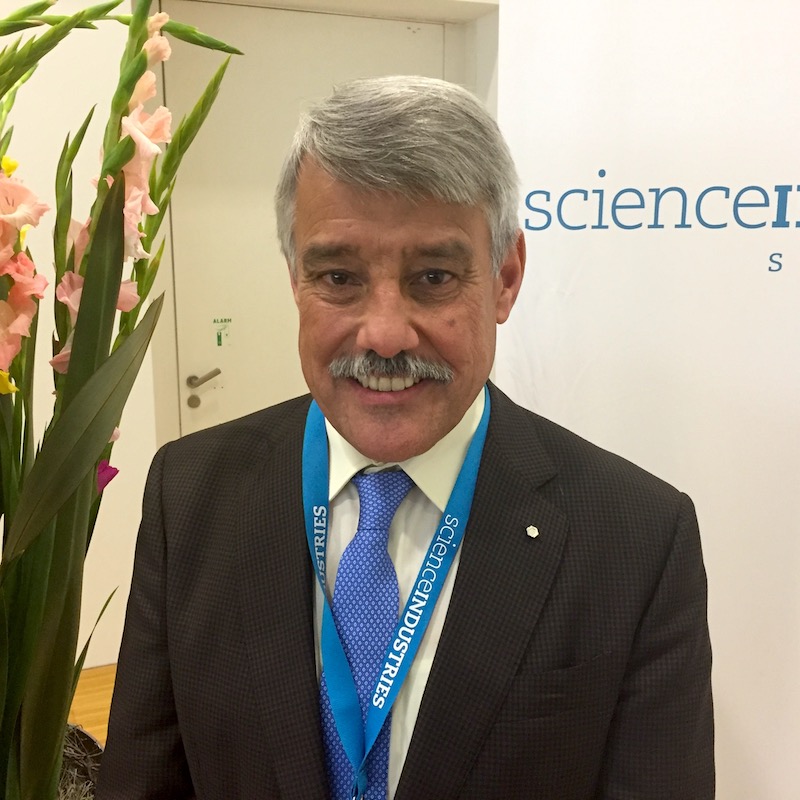 At its general assembly at Siegfried AG, Zofingen, on May 19, 2017, the delegates of scienceindustries elected PD Dr. Hans Peter Lüthi from ETH Zurich as new member of the executive board. Hans Peter Lüthi succeeds Prof. Christoph Copéret as SCS delegates and will be part of the the "Vorstandsausschuss Bildung und Forschung VABF".
At its general assembly at Siegfried AG, Zofingen, on May 19, 2017, the delegates of scienceindustries elected PD Dr. Hans Peter Lüthi from ETH Zurich as new member of the executive board. Hans Peter Lüthi succeeds Prof. Christoph Copéret as SCS delegates and will be part of the the "Vorstandsausschuss Bildung und Forschung VABF".
 About scienceindustries
About scienceindustries
scienceindustries is the Swiss business association for the chemical, pharmaceutical and biotech industries. More than 250 companies within the chemical, pharmaceutical, biotech and other science-based industries operating in Switzerland are members. scienceindustries is a significant member of economiesuisse, the umbrella organization of the Swiss economy.
More information on the website: https://en.scienceindustries.ch
David Spichiger, SCS
20.06.2017
ILMAC Lausanne, 04.10.-05.10.2017
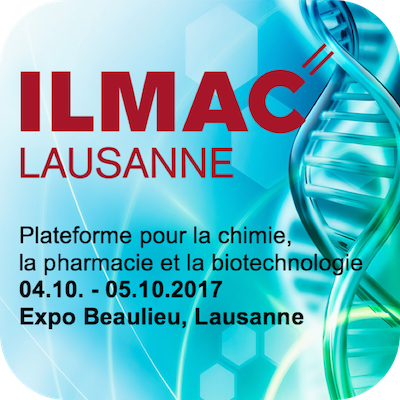 ILMAC Lausanne
ILMAC Lausanne
Plateforme pour la chimie, la pharmacie et la biotechnologie
04.10. - 05.10.2017 | Expo Beaulieu Lausanne
ILMAC is providing the chemical and life science community with a new platform in Lausanne on 4 and 5 October 2017 and thus closing the gap on the French-speaking Swiss market. In a relaxed and convivial atmosphere, the latest knowledge is to be imparted at this event, coupled with an exhibition of high-quality product offerings.
Location
Expo Beaulieu Lausanne, hall 7
Avenue Bergières 10
1004 Lausanne
Opening times
9 a.m. to 5 p.m.
David Spichiger, SCS
31.05.2017
Thomas Ward wins Royal Society of Chemistry award
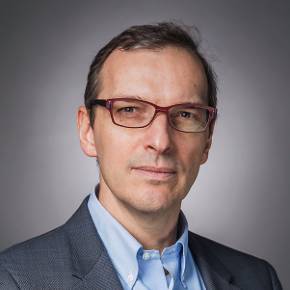 Basel chemist Thomas Ward, Professor of Bioinorganic Chemistry at the University of Basel and Director of the NCCR Molecular Systems Engineering, is the Royal Society of Chemistry Bioinorganic Chemistry Award winner for 2017.
Basel chemist Thomas Ward, Professor of Bioinorganic Chemistry at the University of Basel and Director of the NCCR Molecular Systems Engineering, is the Royal Society of Chemistry Bioinorganic Chemistry Award winner for 2017.
Professor Ward’s group has been combining chemical and biological tools for fifteen years. They create artificial metalloenzymes that can be used for the production of biofuels or as highly specific drugs to target and destroy diseased cells.
The Bioinorganic Chemistry Award is awarded for outstanding research in any aspect of bioinorganic chemistry. Professor Ward receives £2,000, a medal and a certificate.
He said: “I am extremely pleased and honored to be recognized by the bio-inorganic community. It feels good to be part of this great family of scientists.”
Since 2008 Thomas Ward is Professor for Bioinorganic Chemistry at the University of Basel. Since 2016, he heads the directorate of the National Centre of Competence in Research (NCCR) Molecular Systems Engineering.
His research is centered on the exploitation of proteins as host for abiotic cofactors. The resulting artificial metalloenzymes display features reminiscent of both homogeneous catalysts and enzymes. Such systems can be optimized in vivo by Darwinian evolution schemes.
Website: http://www.chemie.unibas.ch/~ward/
https://www.unibas.ch/en/News-Events
23.05.2017
Page 95 of 299
